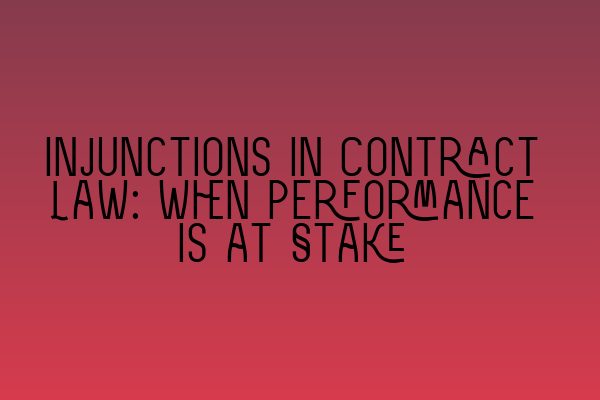Injunctions in Contract Law: When Performance is at Stake
Contracts are the foundation of business relationships, governing the rights and obligations of parties involved. However, there are instances where one party fails to fulfill their contractual obligations, potentially causing significant harm to the other party. In such situations, seeking an injunction may be a viable option to ensure that performance is maintained and potential damages are mitigated.
At SQE Contract Law, we understand the complexities of contract law and the importance of safeguarding our clients’ interests. In this blog post, we will delve into the concept of injunctions in contract law, exploring when they can be utilized as a valuable legal remedy. But first, let’s establish a clear understanding of what an injunction entails.
What is an Injunction?
An injunction is a legal remedy granted by a court that requires a party to either perform a specific action or cease from doing something. In the realm of contract law, an injunction is often sought when one party breaches or threatens to breach their contractual obligations. It can effectively compel the defaulting party to fulfill their contractual duties or prohibit them from engaging in conduct that would cause harm to the other party.
There are two main types of injunctions commonly used in contract law:
1. Mandatory Injunction
A mandatory injunction is employed when the court orders a party to perform a specific action. This type of injunction is sought when the non-breaching party requires the defaulting party to fulfill their contractual obligations. For example, if a supplier fails to deliver goods as specified in a contract, the buyer may seek a mandatory injunction to compel the supplier to fulfill the delivery.
2. Restrictive Injunction
A restrictive injunction, on the other hand, prohibits a party from engaging in certain activities. This type of injunction is typically sought when the non-breaching party wants to prevent the defaulting party from causing harm or continuing a breach of contract. For instance, if an employee breaches a non-compete agreement by joining a competitor, the employer may seek a restrictive injunction to prevent the employee from working for the competitor.
When Can You Seek an Injunction?
While seeking an injunction can be an effective legal remedy, it is crucial to understand the circumstances under which it can be utilized. To successfully obtain an injunction in contract law, the following conditions must generally be met:
1. Breach of Contract
An injunction is typically sought when there is a clear breach of contract. The non-breaching party must be able to demonstrate that the other party has failed to fulfill their contractual duties or has threatened to breach their obligations. It is essential to provide sufficient evidence to prove the existence and terms of the contract, as well as the breach itself.
2. Irreparable Harm
The non-breaching party must establish that they will suffer irreparable harm if the breach continues or if the defaulting party is not compelled to perform their obligations. In other words, simply seeking monetary damages would not be sufficient in these circumstances. The harm experienced must be substantial and not adequately compensable through monetary means.
3. Balance of Convenience
When considering whether to grant an injunction, the court will assess the balance of convenience. This means weighing the potential harm caused to the non-breaching party against the potential harm suffered by the defaulting party if the injunction is granted. The court will determine if the injunction is justified and reasonable in the circumstances.
4. Strong Likelihood of Success
In order to obtain an injunction, the non-breaching party must demonstrate a strong likelihood of success in proving their case on its merits. This involves presenting compelling evidence that clearly shows the breach of contract and the harm being suffered.
The Importance of Seeking Legal Assistance
Seeking an injunction in contract law can be a complex and challenging process. It requires a thorough understanding of contractual rights and obligations, as well as the ability to present a compelling case to the court. Engaging the services of a knowledgeable contract law solicitor, like those at SQE Contract Law, is crucial to navigate the intricacies of seeking an injunction.
Our experienced solicitors will assess your case, gather the necessary evidence, and guide you through the legal process. We will work tirelessly to protect your rights and secure the best possible outcome for you and your business.
Conclusion
Injunctions play a vital role in contract law, ensuring that parties fulfill their obligations and minimizing potential damages. Whether seeking a mandatory injunction to compel performance or a restrictive injunction to prevent harm, obtaining an injunction requires satisfying certain legal requirements.
For expert advice on injunctions in contract law or any other legal matters, contact SQE Contract Law today. We are here to provide the comprehensive legal insights and assistance you need.
Related Articles:
– Exploring the Impact of Frustration on Contractual Obligations: Legal Insights
– Interpreting Contractual Clauses: Unlocking the Hidden Meanings
– Legal Aspects of Business Contracts: Key Considerations for Entrepreneurs
– SQE Contract Law vs. Traditional Qualifications: A Comparative Analysis
– Agreements in Contract Law: Understanding Its Various Types
